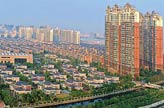Politics
Govt leadership changes continue
Updated: 2011-08-30 08:08
By Zhao Yinan (China Daily)

BEIJING - More regional leadership reshuffles may be expected following changes to the top leaders of five provincial-level regions last week, as the Communist Party of China (CPC) gears up for next year's Party congress, experts said.
Zhu Lijia, a public administration expert at the Chinese Academy of Governance, told China Daily on Monday that last week's personnel changes, in which seven provincial governors and Party chiefs from five provinces and autonomous regions were removed, were part of a national reshuffle, and more rearrangements may be expected in the near future.
"Such personnel changes are being made to pave the way for the impending 18th National Congress of the CPC, when a new leadership lineup will be elected," Zhu said.
Chen Quanguo has been appointed secretary of the CPC committee of Tibet.
In addition, Qin Guangrong has been appointed secretary of Yunnan Provincial Committee of the CPC, replacing Bai Enpei, while Luo Baoming has been appointed secretary of Hainan Provincial Committee of the CPC, replacing Wei Liucheng.
All of the departing leaders have turned 65, a standard retirement age for ministerial-level officials in China, and have been appointed as senior officials in the National People's Congress, China's top legislature.
Zhang Yunchuan, former Hebei Party chief, and Bai Enpei, former Yunnan Party chief, were appointed deputy directors of the NPC Environment Protection and Resources Conservation Committee.
Wei Liucheng, former Party chief of Hainan, and Lu Zushan, former governor of East China's Zhejiang province, were appointed deputy directors of the NPC Financial and Economic Affairs Committee.
Lu's successor has not yet been named.
Zhu said such rearrangements usually start at least two years before the CPC's national congress, a five-yearly personnel change in the country's top ruling body.
In particular, Zhang Qingli, 60, who had been working in ethnically concentrated Xinjiang Uygur and Tibet autonomous regions for 12 years, was appointed Party chief in Hebei province, which borders Beijing and Tianjin municipalities.
Zhang Qingwei, 50, former president of a leading commercial airplane manufacturer, was nominated acting governor of Hebei, replacing his predecessor, Chen Quanguo. Chen was designated the Party chief of Tibet.
"Zhang is not the first entrepreneur in China who has become a provincial leader," said Liu Shanying, a political researcher at the Chinese Academy of Social Sciences.
"Businessmen-turned-political leaders can make the best use of their social resources to attract investment for a relatively underdeveloped region."
Last week's reshuffle was made along with the nomination of dozens of director-level officials, in which at least three officials from the central government departments responsible for the economy, finance and foreign trade, were appointed deputy mayors or Party officials of coastal cities.
Liu said the purpose of the reshuffle was to help local governments better balance economic development and improvement of people's living standards.
"By selecting officials from Beijing, the central government hopes local leaders can better comprehend and carry out its policies," Liu said.
China Daily
(China Daily 08/30/2011 page4)
E-paper

City's dynamic teutons
German cluster gives a fillip, competitive edge to local economy in Taicang
Short and sweet
Game for growth
Character reference
Specials

Hunting grounds
Opinion divided as China debates opening door to international players

Flying the TCM flag
A small German town is home to Europe's flagship clinic for traditional Chinese medicine

Animal attraction
World's youngest chief fur designer set to launch own label and tap into huge China market.
